“超级蓝血月”+月全食今晚现身!送你一份观天攻略 For the first time in 152 years, a supermoon, blue moon, and total lunar eclipse will coincide
中国日报网 2018-01-31 13:53

北京时间1月31日晚,天文爱好者等待已久的“超级蓝月”+“月全食”将在天幕现身。该准备哪些长枪短炮?用手机如何拍出最美照片?观月还需储备哪些知识点?收下这份观月攻略,让你有备而去,尽兴而归。
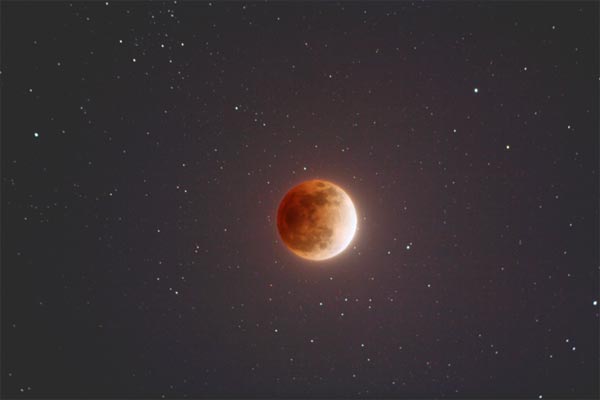
此次“超级蓝月”与月全食组合为何如此受瞩目?
其实,“蓝月”并不稀有,但如果“蓝月”是一颗“超级月亮”,又同时发生月全食,那就是十分罕见的天象。
On January 31, you will be treated to both a visible supermoon—what we call a full moon at its closest orbital point to Earth—and a total lunar eclipse. As the second full moon of the month, it earns the title of a blue moon as well. The celestial coincidence hasn’t happened in more than 150 years. That means there were people who lived and died on this Earth without ever having had a chance to see this phenomenon, which won’t reappear again for another decade.
1月31日,你会同时看到肉眼可见的超级月亮和月全食。超级月亮指的是在绕地运行轨道上处于近地点的满月。作为1月第二次满月,这次超级月亮也被称为超级蓝月。这种天文上的巧合是150多年来首次出现,也就是说有人一辈子都没有见过,而未来十年都不会重现。
This supermoon also happens to be the final one in a supermoon trilogy—the first two of which appeared on Dec. 3 and Jan. 1.
这次超级月亮还是一连三次超级月亮的最后一次——前两次发生在2017年12月3日和2018年1月1日。
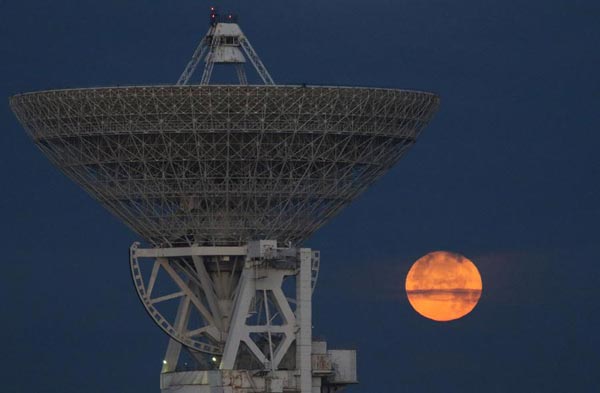 |
| A "supermoon" full moon sets over the RT-70 radio telescope in the village of Molochnoye, Crimea January 2, 2018. REUTERS/Pavel Rebrov |
准备好迎接“超级蓝血月”吧!
Visible supermoons appear 14% bigger and 30% brighter than full moons that occur at the farthest point in the moon’s orbit. During the eclipse, with totality visible from eastern Asia across the Pacific to western North America, the moon will slowly lose its brightness and take on a reddish hue because of the way the atmosphere bends the light, says NASA.
肉眼可见的超级月亮看起来比在月球轨道上距离地球最远的满月要大14%、亮30%。美国国家航空航天局表示,在月食期间,月球将缓缓变暗,并且因光线经过大气层发生折射而呈现出红铜色。从东亚经太平洋直至北美洲西部地区,可以观测到月全食。
As a result, totally eclipsed moons are sometimes also called “blood moons.”
因此,月全食有时也叫“血月”。
【小知识:“蓝月”、“血月”究竟是啥?】
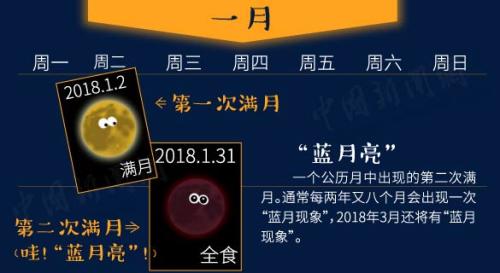
“蓝月”当然不是形容月亮的颜色。“蓝月”由英语“blue moon”直译而来,意为“罕见的事情”。天文学中,“蓝月”是一个月中的第二次满月,因相对罕见而被叫做“蓝月”。
“超级月亮”指的是月亮“微胖的体型”。本次“蓝月”发生时,月亮恰在近地点附近,从地球上用肉眼观测,月亮看起来比平时更大。
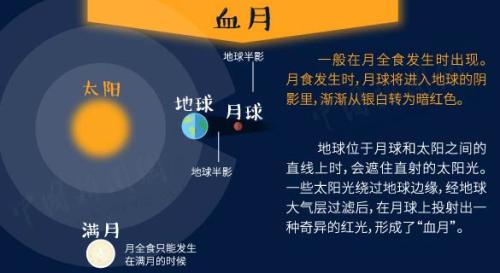
月全食和“血月”又有何联系?事实上,在月全食现象发生时,会有“血月”出现。月全食现象包括初亏、食既、食甚、生光、复圆,本次月全食的最精彩部分将在20时52分左右出现,全食阶段将持续1小时16分钟。
【观月指南】

此次“超级蓝月”与月全食“大戏”,将在我国绝大部分地区上演,且月全食主要过程发生在前半夜,非常利于观测和拍摄。同时,全球太平洋地区和北美西海岸地区也能一睹风采。
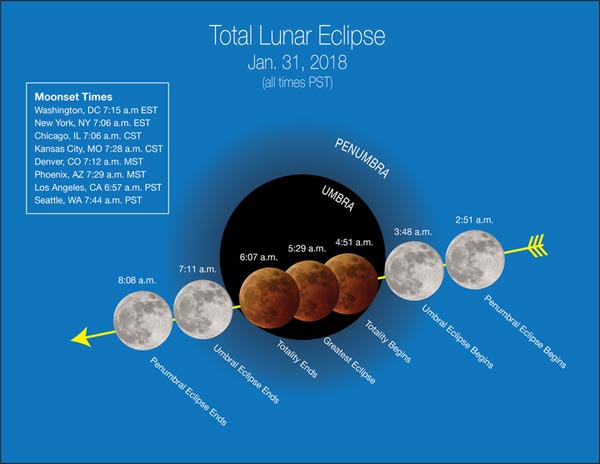 |
| A NASA graphic showcases a timeline for the upcoming eclipse. |
When can I see the supermoon and total lunar eclipse?
何时能看到超级月亮和月全食?
The best time to enjoy a supermoon is right after moonrise and before sunrise, when the moon is sitting on the horizon. It will appear its biggest and brightest because of a “moon illusion” effect that’s created when you are able to compare the lunar body to other objects for scale, like buildings and foliage.
观赏超级月亮的最佳时间是在月亮初升后和太阳升起前的那段时间。这个时候月亮位于地平线以上。月亮将显得最大、最亮,这是由于你把月球与建筑物、树叶等其他物体比较大小时会产生“月径幻觉”现象。
For the real highlight of the show, the lunar eclipse will begin at 6:48am ET and reach its maximum at 8:30am ET. Viewers from eastern Asia, the Pacific, and western North America will get the best view, but viewers in eastern North America and Europe will also catch a partial eclipse.
至于这场天文奇观的真正高潮,月食将从美国东部时间早上6时48分(北京时间19时48分)开始,美国东部时间早上8时30分月食程度达到最大。人们在东亚、太平洋和北美洲西部将能看到月食全过程,但在北美洲东部和欧洲只能看到月偏食。
What’s the best way to photograph the lunar eclipse?
给月食拍照的最佳方法是什么?
To take a picture of the supermoon or the lunar eclipse with a smartphone, tap on the moon on the screen and hold your finger in place to lock the camera’s focus. Then adjust the exposure slider that appears next to your finger to get the right balance of light for your shot.
如果用智能手机拍摄超级月亮或月食的照片,可用手指在手机屏幕上轻点月亮,并保持一会儿,以便锁定对焦。然后调节出现在手指旁边的曝光滑块,获得拍摄照片合适的光平衡。
If you’re using a DSLR, NASA’s senior photographer Bill Ingalls recommends that you use the daylight white balance to adjust for the sunlight being reflected off the moon. He says that it’s important to keep in mind that the moon is a moving object: “It’s a balancing act between trying to get the right exposure and realizing that the shutter speed typically needs to be a lot faster.”
如果用数码单反相机,美国国家航空航天局高级摄影师比尔•英戈尔斯建议使用日光白平衡来调节月亮反射的太阳光。他说,重要的是记住月亮是移动的物体,“努力达到恰当曝光的同时也要知道快门速度需要比平时加快,这两者要小心兼顾”。
To get an original shot, Ingalls suggests taking a picture that puts the moon in context of a local landmark, something that gives your photo a sense of place. “Don’t make the mistake of photographing the moon by itself with no reference to anything,” say Ingalls. “Everyone will get that shot.”
要想拍到一张有创意的照片,英戈尔斯建议拍照时把月亮放在某个本地地标物的背景下,这个地标物可以让照片有一种地域感。他说:“不要在没有任何参照物的背景下单独拍月亮。那种照片谁都能拍。”
Do I need special glasses to watch the supermoon and lunar eclipse?
是否需要特殊的眼镜观测超级月亮和月食?

与日全食不同,月全食对于观赏器材的要求并不高。因此,观看月全食,你需要准备的是……在一个天气晴朗、看得见月亮的地方,吃饱穿暖,擦亮眼睛。
Unlike the solar eclipse, the supermoon and the lunar eclipse are safe to view with the naked eye. There’s nothing to worry about if you find yourself enthralled and staring up into the sky for a very long time. Except maybe your neck.
与日食不同,超级月亮和月食可以安全地用裸眼观测。如果你发现自己着迷地长时间凝望天空,不用担心什么。只是脖子可能会不舒服。
【2018天象知多少?】
除了1月31日的“超级血月”逢“蓝月”,2018年天象“剧场”还有哪些不容错过的天文奇观值得期待?一起来瞅瞅吧~
火星冲日 错过要等17年
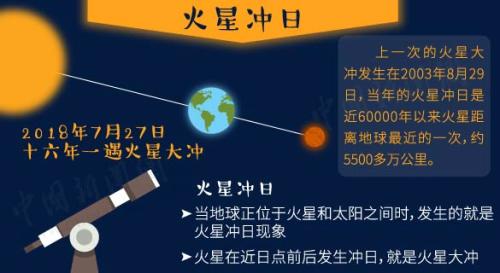
7月27日将发生火星冲日现象,16年一遇,国内观测条件佳。火星,古代中国称之为“荧惑”,因地表覆盖氧化铁沙尘,看起来荧荧似火。7月27日那天,如果你看到一颗奇怪的闪着红色光的星星,那就是冲日的火星。
陪你去看流星雨
今年还有2次流星雨值得观测,“陪你去看流星雨”的浪漫需求有望达成。
8月13日,极大的英仙座流星雨将“降临”地球,预测每小时天顶流量将有100颗左右,观测条件佳。
12月14日晚,将迎来双子座流星雨,明亮、速度中等、持续时间长,后半夜观测条件佳。
“带偏食日落”将上演
8月11日,还将出现日偏食天象,我国大部分地区可见。尽管因地理位置因素,在国内无法观测偏食的全过程,但偏食的“尾巴”也值得期待。
来源:qz.com、参考消息网、中新网
翻译&编审:yaning









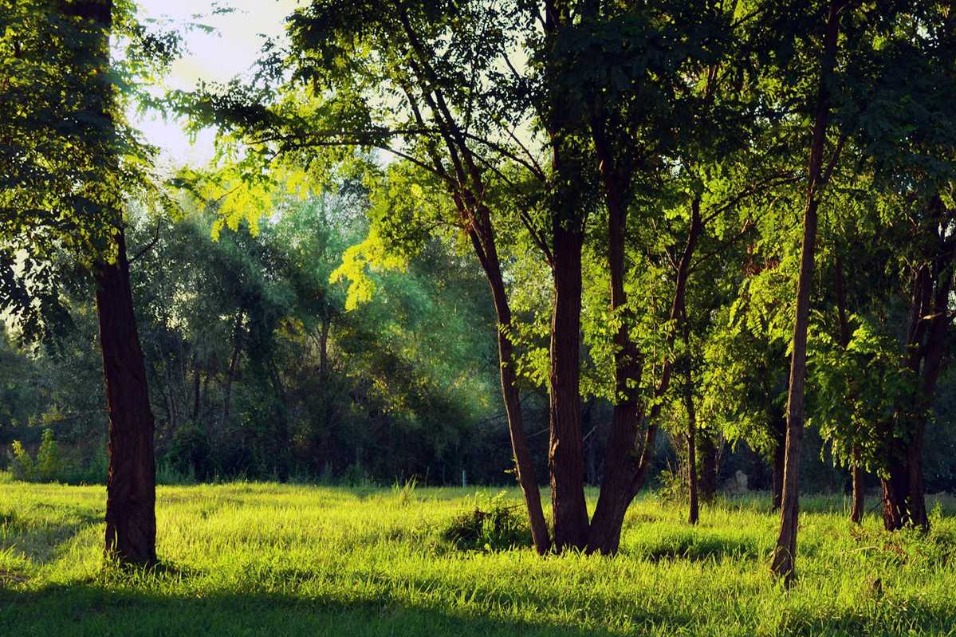







 英语点津微信
英语点津微信 双语小程序
双语小程序